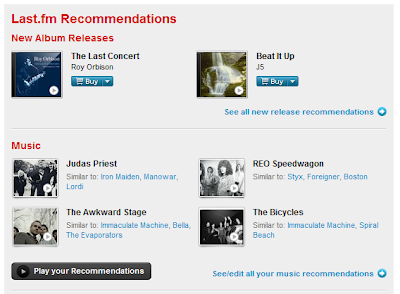This is the first post in a series about how data helps me make decisions, maintain ongoing histories, and discover new things.
Music plays a huge role in our lives as an uplifter, a comforter, a creative outlet, and an escape. I can think of few things more perfect to collect information on and analyze.
I listen to most of my music on my computer or my iPod. Since June of 2006, I have been saving statistics on nearly every music file I've listened to with a program/website called last.fm. Last.fm saves the artist, song, album, date and time the song was listened to, and generates a dynamic music history for each user.
Last.fm has a built-in recommendations system. It compares your listening habits with those of millions of other users to generate recommendations for new artists to listen to or upcoming concerts to attend. The more music you "scrobble" to last.fm, the better your recommendations become, and the more music you discover.
Last.fm has an open API (application programming interface), which means that developers and programmers can create websites and programs that can access your last.fm data and give you more insight into your listening habits. One graph-generator I found (sorry, lost the link!) plots fascinating historical charts which allow you to visualize your listening habits over time. It's interesting to see your subconscious listening habits pop out - listening to certain artists exclusively during final exams, or the summer, or on weekends.
One of my favourite recent websites to compliment last.fm is called BandsInTown. You can sign up in two clicks with an existing Twitter account then import your last.fm or Pandora history. Finally, you give BandsInTown your location (ie, city or province) and it compiles a cloud of concerts in your area based on your last.fm musical preferences.
Don't want to constantly check BandsInTown or last.fm for upcoming concerts? No problem. BandsInTown allows you to import your concert recommendations to Google Calendar (and you can get the time zones right by using this little script that I wrote).
Now I listen to songs, have them scrobbled to last.fm, which is monitored by BandsInTown for concerts in my area, which automatically show up on my Google Calendar.
This proves to be amazing every time I check my calendar and discover a new concert that I'd love to see. In my opinion, a setup like this is essential for music lovers. Given that technology exists to automate this process, if you don't do this you are wasting data.
Data waste - there's a concept I want to return to!





Awesome post as always Brahm! The link to the Last.fm graph-generator you mentioned is:
ReplyDeletehttp://lastgraph.aeracode.org/